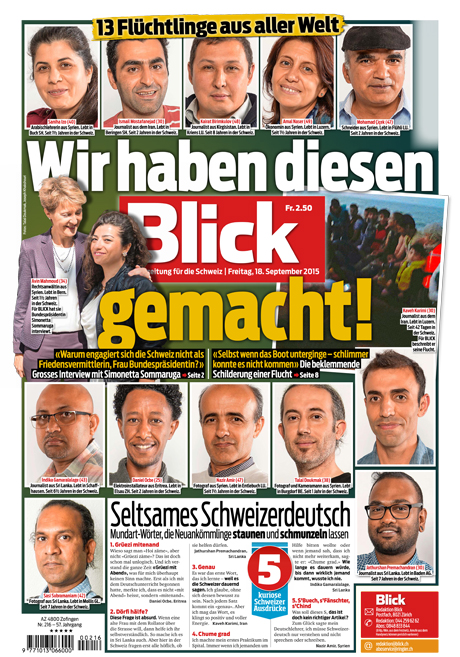
The refugee crisis has dominated headlines in recent weeks, as thousands of people flee war-torn Syria to start new lives in Europe. Many news outlets have sent journalists to Hungary, Serbia, Croatia, or Greece to report on the refugees' journeys and the situations they encounter along the way.
Swiss tabloid Blick is one of them – but despite the number of reporters they might have across Europe, they can only get a glimpse into what the refugees themselves are thinking, said editor-in-chief René Lüchinger.
"So the idea of publishing a newspaper made by them was born," he told Journalism.co.uk. The issue of Blick published on 18 September was written and edited by a team of 13 refugees, many of them journalists and photographers in their countries.
"It was very emotional... because they could work in their profession. Some of them didn't do that for years, it's the first time they've worked at a newspaper once more," Lüchinger said.
Blick reaches around 650,000 readers daily in the German part of Switzerland, and is part of a media organisation that publishes two websites and two other papers – an evening and a Sunday edition.
The daily paper's new editorial team was put together by contacting refugees with "a little affinity for newspapers" with the help of Swiss organisations and academic institutions who teach journalism.
The team included refugees from Syria, Sri Lanka, Iran, Kyrgyzstan and Eritrea, the majority of them journalists and photographers – but also a translator and an electrician.

"We made this Blick!". Friday's front page, image courtesy of Blick.
Lüchinger explained the focus for the edition was to get an insight into the journey refugees make to reach their destination, how it feels to leave the country they grew up in, and the experience of settling in a different country and culture.
"They could do what they wanted. We had some translators, and we gave some input," he explained, but added that there were no other organisations involved in the editorial process.
A group of Blick's new reporters interviewed Swiss Confederation president Simonetta Sommaruga, for example, who met the journalists in a restaurant in Zurich accompanied by her personal assistant.
"One of the refugees told us that would be impossible in his country," said Lüchinger," and if the prime minister would give an interview, then the whole city would be closed."
Blick's initiative surprised many readers who weren't expecting a tabloid to make such a move, he explained, but the reactions were overwhelmingly positive.
And Lüchinger told Journalism.co.uk he hopes Blick has changed the way in which its readers think about refugees.
"Maybe we changed a little bit the thinking of some readers when they see people from Syria or from Eritrea in their country... so they think a little bit about what these people have gone through.
"The only thing they want is to have a good future for themselves and for their families, and that is the same thing Swiss people want and it is the same thing which every man, every woman in this world wants to achieve."
Update: This piece has been edited to correct Blick's circulation figures.
Free daily newsletter
If you like our news and feature articles, you can sign up to receive our free daily (Mon-Fri) email newsletter (mobile friendly).









